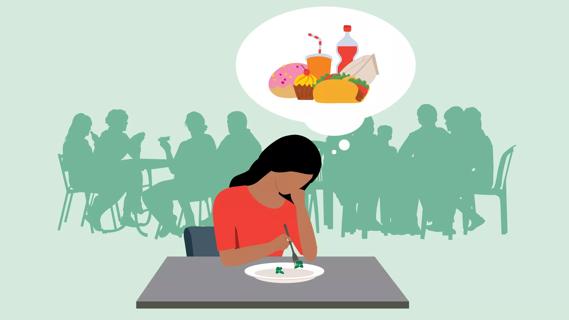An obsession with eating ‘clean’ or ‘healthy’ can be both physically and emotionally damaging

In general, it’s good to follow a balanced diet. But sometimes, being so focused on your health can swing in the opposite direction — and become harmful to both your body and mind.
Advertisement
Cleveland Clinic is a non-profit academic medical center. Advertising on our site helps support our mission. We do not endorse non-Cleveland Clinic products or services. Policy
Psychologist Kasey Goodpaster, PhD, explains what orthorexia nervosa is and what treatments may help.
Orthorexia nervosa is a pathological obsession with eating “clean” or “healthy” foods. People who have this condition focus on their diet so strictly (and so restrictively) that it takes both a physical and mental toll.
The name comes from the English ortho, meaning “proper,” and orexia, Latin for “appetite.” Nervosa is Latin for something that relates to the nervous system, causing mental and emotional distress.
Behaviors associated with orthorexia typically include:
“These behaviors share many characteristics with anorexia nervosa,” Dr. Goodpaster says. “The difference is that people living with anorexia restrict the quantity of the food they eat, whereas people living with orthorexia focus on the quality of the food.”
Though orthorexia is often referred to as an eating disorder, it isn’t listed in the DSM-5, the manual that mental health providers use to diagnose mental health conditions (including eating disorders). More and more research is being done on this condition, though, and it’s acknowledged by the National Eating Disorders Association.
Advertisement

Image content: This image is available to view online.
View image online (https://assets.clevelandclinic.org/transform/9f18c22b-48d3-4455-a47b-30c97d19c910/orthorexia-infographic)
Because it’s not an officially recognized eating disorder, it’s hard to define where, exactly, healthy eating ends and an obsessive fixation on nutrition begins. But based on existing research compiled by the National Eating Disorders Association and others, here’s a look at behaviors that may point to orthorexia:
“The line between a commitment to healthy eating and orthorexia lies with the ability (or inability) to practice moderation, and whether the drive to eat healthily creates distress,” Dr. Goodpaster explains.
Living with an eating disorder can be both physically and emotionally damaging, negatively impacting your quality of life. Some of the effects of orthorexia can include:
Advertisement
Anyone can develop an eating disorder. But you may be at higher risk for orthorexia nervosa if you have a history of:
“The obsession with ‘clean’ eating seems to be another manifestation of our diet culture, in which there is a heavy emphasis on thinness often masked by a desire for health,” Dr. Goodpaster notes.
Research agrees. As one study puts it, “Constant exposure to curated images of seemingly ‘perfect’ bodies and ‘healthy’ eating habits can create an environment that normalizes extreme dieting and reinforces that adhering to strict dietary rules is the key to achieving health and success.”
There aren’t many studies that evaluate the effectiveness of treatments for orthorexia. But experts say cognitive behavioral therapy (CBT) may help, especially an approach called “exposure and response prevention” that aims to reduce eating-related obsessions. It has been proven effective for conditions like OCD.
This type of therapy involves slowly reintroducing you to foods you fear, while a trained therapist helps you learn to recognize and redirect your intrusive thoughts about food. They can also teach intuitive eating principles and mindfulness strategies.
Advertisement
“Eating is so complex that it’s downright impossible to be perfect,” Dr. Goodpaster recognizes. “A healthier and more sustainable lifestyle comes from learning to recognize that deviating from your intentions to eat in a particular manner is completely normal — and not a sign of personal failure.”
If you or someone you know shows signs of orthorexia, talk with a healthcare provider about your concerns.
Advertisement
Learn more about our editorial process.
Advertisement

Eating disorders are diagnosable mental health conditions, while disordered eating is unhealthy eating behavior that doesn’t meet the criteria for a diagnosis

This is an eating pattern that doesn’t meet the criteria for an eating disorder but can still be harmful

Having overweight and disordered eating is a high-risk combination that often gets dismissed or overlooked

While social media content doesn’t create eating disorders, it can easily exacerbate them

Get moving, avoid the scale and be kind to yourself — plus, learn your triggers

It may be mistaken for digestive problems

Don’t let emotions trigger bad food habits

Alternating between periods of eating and fasting may benefit your health

Wearing a scarf, adjusting your outdoor activities and following your asthma treatment plan can help limit breathing problems

Your diet in the weeks, days and hours ahead of your race can power you to the finish line

When someone guilt trips you, they’re using emotionally manipulative behavior to try to get you to act a certain way